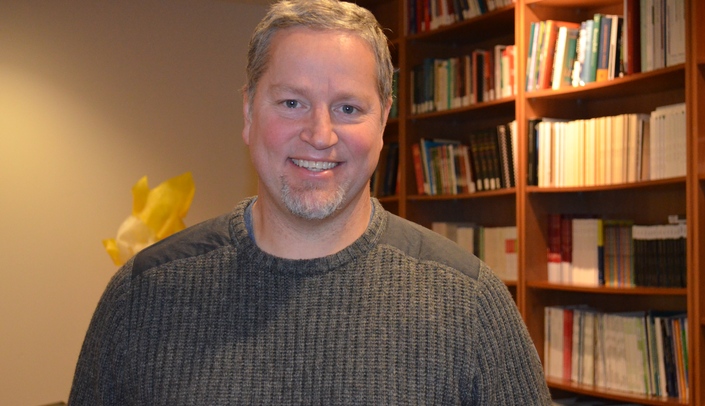The University of Nebraska Medical Center has launched a digital type 2 diabetes prevention clinical trial that features a virtual interactive program that provides personalized guidance and weekly interactive lessons to encourage healthy habits. It is the largest-ever single blind, randomized control trial of a digital diabetes prevention program (DDP).
It's estimated that 86 million Americans now have prediabetes — that's one out of three adults — and nine out of 10 are unaware they are at risk. Without intervention, many people with prediabetes could develop type 2 diabetes within five years.
The program is accessible through personal electronic devices — computer, laptop, Smartphone and tablet — and it can link to a Fitbit or other fitness wearable devices. It combines proven behavioral science and the power of social networking with cutting-edge technology and world-class design.
The trial, called PREDICTS (Preventing diabetes with digital health and coaching for translation and scalability), is a collaboration between Omada Health, Wake Forest University in Winston-Salem, N.C., and UNMC.
Paul Estabrooks, Ph.D., the Harold M. Maurer Distinguished Chair for Health Promotion, Social and Behavioral Health in the UNMC College of Public Health, is co-investigator of the three-year study. He has led a number of large trials examining how diabetes prevention and weight management interventions can be implemented and taken to scale in community and clinical settings.
"This PREDICTS trial is unique in that participants get together as a group — but virtually — and engage in a year-long diabetes prevention program while also getting resources they can use when and where they want them," Dr. Estabrooks said.
"We're excited about this clinical trial and the ability to study how best to integrate effective, scalable preventive services, especially digitally-enabled ones, into typical clinical practice. In fact, we'll be able to shed some light on strategies that will speed the translation of high-quality, research-tested diabetes prevention interventions into sustained clinical practice," he said.
Omada Health, based in San Francisco, is the leading provider of digitally-enabled intensive behavioral counseling that enables individuals at elevated risk of chronic conditions, like type 2 diabetes, to change habits that put them most at risk.
UNMC is in the process of enrolling approximately 500 participants who will be randomly assigned to either the digital Omada Program or a comparison group through UNMC's current clinical practice that features a single two-hour in-person diabetes prevention class.
During the trial, UNMC will lead data collection and study the implementation process, while researchers at Wake Forest will be responsible for data system management, quality operational reports, evaluation, and analysis. Omada will run the experimental arm of the trial and provide engagement and outcome data for analysis.
In addition to tracking weight loss and reduction in A1c blood sugar levels, the PREDICTS trial also will track the impact of the Omada program on participants' quality of life, stress levels, and health care use, among other measures. This will be the first time many of these measures are tracked in a randomized controlled trial of a digitally-delivered DPP.
Through the Omada platform, participants will have access to a personal coach, support group and weekly interactive lessons that provide information on healthy eating, nutrition, physical activity, stress and locking in healthier habits. The platform also provides ways to share information and chat with group members.
For more information about the trial, contact Kathryn Wilson, Ph.D., UNMC College of Public Health, kathryn.wilson@unmc.edu or 402-559-9375, or at www.unmc.edu/preventdiabetes. the study website.
The National Institute of Health study
It's estimated that 86 million Americans now have prediabetes — that's one out of three adults — and nine out of 10 are unaware they are at risk.
The PREDICTS study is patterned after a study originally conducted by the Diabetes Prevention Program Research Group with funding from the National Institutes of Health. Results were published in 2002.
In that study, 3,234 participants from 27 clinical centers around the U.S. were divided into three groups. Each person in the first group was assigned a health counselor and to a health center or YMCA where they met for a one-hour class each week and received behavior modification information. The second group received metformin, the first-line medication for the treatment of type 2 diabetes, and the third a placebo.
In the lifestyle intervention group, those receiving intensive individual counseling and motivational support on effective diet, exercise, and behavior modification, reduced their risk of developing diabetes by 58 percent. Lifestyle changes worked particularly well for participants aged 60 and older, reducing their risk by 71 percent. About 5 percent of the lifestyle intervention group developed diabetes each year during the study period, compared with 11 percent of those in the placebo group.
The overall goal of the PREDICTS digital diabetes prevention study is to find ways to translate the academic work on this intervention into clinical and community practice while maintaining outcomes and data integrity, said Jeffrey Katula, Ph.D., associate professor in health and exercise science at Wake Forest University and co-investigator. He led the "Healthy Living to Prevent Diabetes" project at Wake Forest, intended to translate clinical literature on DPP into community practice.
"The study will move the field ahead in our ability to do that," Dr. Katula said.
Omada's Clinical Research Director Cynthia Castro Sweet, Ph.D., who is leading the trial for Omada, said, "Even with the research to date in published literature, there is still some debate about the efficacy of virtual programs. The outcomes of the PREDICTS trial should help resolve these concerns and move policy towards accepting digital DPP as a proven, evidence-based and effective means to reduce risk for costly chronic diseases."
We are Nebraska Medicine and UNMC. Our mission is to lead the world in transforming lives to create a healthy future for all individuals and communities through premier educational programs, innovative research and extraordinary patient care.
Twitter | Facebook | Instagram | YouTube | Flickr
